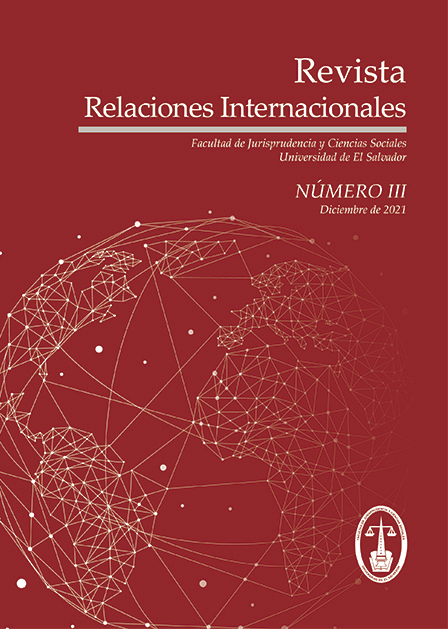The cyberspace as a zone of geopolitical control and the role of the great powers for the cyber supremacy: China and The United States
Keywords:
Attacks, Cyber politics, Cyber agents, Cyber attacks, Cybersecurity, Cyber defense, Espionage, GeopoliticsAbstract
The use of Internet through tools, applications, and digital environments available to millions of users around the world, turned cyberspace into a geopolitical area. This article aims to make a brief description about methods and actors within the so-call cybergeopolitics and the race in where States are in a privileged place in the manufacture of devices and creation of software. The competition to achieve control of the information and the data distribution between the great powers is of the interest not only of privates companies, but rather the governments themselves to take advantage of other States, using various means that include new modalities, such as: espionage by hacking government offices, political figures, manipulation of elections and attacks on critical infrastructures. Intrusions in data systems with private information, they have to come to disrupt the rights of citizens themselves with justification of maintaining national security. Thus, through a bibliographic research, the fundamental concepts to understand how cyber threats are configured between States and users are identified, and what are the key points of why cyberspace is now an area of competition between two of the main technological powers, such as the United States and China; an issue that, in the medium term, will shape the device market and the transmission of data between users on a planetary level, within a technological and cybernetic race in full development.
Downloads
References
Ágreda, Ángel Gómez de. “CIBERESPACIO: de ratones y hombres”, n.o 51 (2015): 1-9. http://www.ieee.es/Galerias/fichero/docs_opinion/2015/DIEEEO51-2015_Ciberespacio_AGdeAgreda.pdf
Ágreda, Ángel Gómez de. Cuaderno de Estrategia 206: Instituto Español de Estudios Estratégicos (2020): 175-211, http://www.ieee.es/Galerias/fichero/cuadernos/CE_206_LasCiudades_AgentesCriticosParaUnaTransformacionSostenibleDelMundo.pdf
Baños, Pedro. “Ciberespionaje, influencia política y desinformación (I)”. El Orden Mundial - EOM, (2017). https://elordenmundial.com/ciberespionaje-influencia-politica-y-desinformacion-i/
Barrios, Miguel. “La Geopolítica Digital: un campo de lucha por la supremacía mundial”. América Latina en movimiento, 30 de septiembre de 2019. https://www.alainet.org/es/articulo/202386
Barrios, Miguel, y Norberto Emmerit. “Geopolítica de la seguridad: las disputas geopolíticas del ciberespacio (III)”. América Latina en movimiento, (2017). https://www.alainet.org/es/articulo/184284
Buzai, Gustavo. “Fronteras en el ciberespacio. El nuevo mapa mundial visto desde Buenos Aires (Argentina)”. Cuadernos de Geografía: Revista Colombiana de Geografía 23, n.o 2 (2014): 85-92. https://doi.org/10.15446/rcdg.v23n2.38088
Casar Corredera, Ramón. El Ciberespacio Nuevo Escenario de Confrontación. Ministerio de Defensa Español, 2012. https://publicaciones.defensa.gob.es/media/downloadable/files/links/m/o/monografia_126.pdf
Centro Criptológico Nacional. Ciberamenazas y tendencia 2018. Ministerio de Defensa Español, 2018. https://www.ccn-cert.cni.es/informes/informes-ccn-cert-publicos/2835-ccn-cert-ia-09-18-ciberamenzas-y-tendencias-edicion-2018-1/file.html
Centro Criptológico Nacional. Ciberamenazas y Tendencias 2020. Ministerio de Defensa Español, septiembre de 2020. https://www.ospi.es/export/sites/ospi/documents/documentos/Informe-Ciberamenazas-Tendencias_2020.pdf.
Cuenca, Arsenio. “El problema de Europa: la dependencia tecnológica de Estados Unidos y China”. El Orden Mundial (2020). https://elordenmundial.com/dependencia-tecnologica-union-europea/
Amnistía Internacional. “Infórmate sobre vigilancia masiva”. Amnistía Internacional. Accedido 12 de marzo de 2021. https://www.es.amnesty.org/en-que-estamos/temas/vigilancia-masiva/
Karpersky. “¿Qué es el spear phishing?” latam.kaspersky.com, 13 de enero de 2021. https://latam.kaspersky.com/resource-center/definitions/spear-phishing.
Martin. “Biden Commerce Pick Sees ‘No Reason’ to Lift Huawei Curbs”. Bloomberg.Com, 4 de febrero de 2021. https://www.bloomberg.com/news/articles/2021-02-04/biden-commerce-pick-sees-no-reason-to-pull-huawei-from-blacklist
Moret, Vicente. El despliegue de las redes 5G, o la geopolítica digital - Elcano, 12 (2019). http://www.realinstitutoelcano.org/wps/portal/rielcano_es/contenido?WCM_GLOBAL_CONTEXT=/elcano/elcano_es/zonas_es/ari31-2019-moret-despliegue-de-redes-5g-geopolitica-digital
Pennington, Rosemary W. “Leak: FBI Is Major Customer of “Hacking Team” Which Produces Malware That Can Remotely Plant Child Porn”. National Vanguard, 28 (2015). https://nationalvanguard.org/2015/07/leak-fbi-is-major-customer-of-hacking-team-which-produces-malware-that-can-remotely-plant-child-porn/
Pérez, Enrique. “Google quiere volver a colaborar con Huawei y solicita a los EE. UU una licencia para regresar a los móviles de la marca china”. Xataka, (2020). https://www.xataka.com/empresas-y-economia/google-quiere-volver-a-colaborar-huawei-solicita-a-ee-uu-licencia-su-software-regrese-a-moviles-marca-china
Redacción. “La investigación de la injerencia rusa en las elecciones de EE.UU. en las que venció Trump en 300 palabras”. BBC News Mundo. Accedido 11 de marzo de 2021. https://www.bbc.com/mundo/noticias-internacional-46400948
Redacción. “Qué es WikiLeaks, la web de filtraciones con que Assange reveló los secretos de EE. UU”. BBC News Mundo, 11 de abril de 2019. https://www.bbc.com/mundo/noticias-internacional-47901012
Rivera, Nicolás. “¿Se convertirá Huawei en Google para proteger a China de EE.UU.?” Hipertextual, 25 de enero de 2021. https://hipertextual.com/2021/01/y-si-futuro-huawei-es-convertirse-google-china-y-proteger-sus-propios-rivales-estados-unidos
TIC Negocios. “Qué es un ciberataque y para qué sirve | TicNegocios.es”. Tecnología para los negocios. Accedido 12 de marzo de 2021. https://ticnegocios.camaravalencia.com/servicios/tendencias/que-es-un-ciberataque-y-que-tipos-existen/
Veiga, Francisco. El Desequilibrio como Orden. Segunda edición. Madrid: Allianza, 2015.
Downloads
Published
How to Cite
Issue
Section
License
Copyright (c) 2021 Revista Relaciones Internacionales

This work is licensed under a Creative Commons Attribution-NonCommercial 4.0 International License.
The authors transfer the copyright rights in favor of the Faculty of Jurisprudence and Social Sciences of the University of El Salvador (through Aequus Editorial) to include their writing in Revista Relaciones Internacionales.








